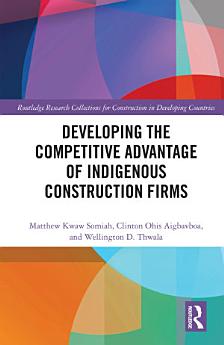Developing the Competitive Advantage of Indigenous Construction Firms
About this ebook
The book is therefore of interest to researchers in construction management, strategic management, civil engineering, business administration, marketing, entrepreneurial and economic studies. It is an essential manual for owners and managers of construction businesses. It is also useful for government departments and non-governmental agencies seeking innovative ways to develop the capacity of indigenous firms and/or contractors to make them more responsive to competitive bidding scenarios, delivery of projects, and satisfying the needs of the industry’s stakeholders.
About the author
Matthew Kwaw Somiah is a civil engineer by profession and a Senior Lecturer at the Faculty of Built and Natural Environment, Takoradi Technical University (TTU), Ghana. Dr Somiah is an academic with extensive knowledge in civil engineering practice, research, training and teaching. He has worked with many construction firms in Ghana as Construction Manager. He has been a Lead Researcher for CoST Infrastructure Transparency International in Ghana. He shares research interest in Strategic Management, Construction Entrepreneurship, Land-use Planning and Housing delivery, and Construction Education. He currently serves as the Chair for Research and Development at the Faculty.
Clinton Ohis Aigbavboa is Professor at the Department of Construction Management and Quantity Surveying, University of Johannesburg, South Africa. He worked as a quantity surveyor on several infrastructural projects, both in Nigeria and in South Africa. Prof. Aigbavboa is currently the Chair of Sustainable Human Settlement and Construction Research Centre at the University of Johannesburg. He is currently the editor of the Journal of Construction Project Management and Innovation (accredited by the DoHET) and has received national and international recognition in his field of research.
Wellington D. Thwala is Professor at the Department of Construction Management and Quantity Surveying, University of Johannesburg, South Africa. Currently, he is the Chair of SARChI in Sustainable Construction Management and Leadership in the Built Environment, FEBE, University of Johannesburg, South Africa. Prof. Thwala has extensive experience of providing consultancy for project leadership and management of construction projects and teaching project management subjects at the postgraduate level. He has an extensive industry experience with research focus on sustainable construction, leadership, and project management. He is the Editor-in-Chief of International Journal of Construction Project Management and Innovation and serves as an editorial board member to various reputable international journals.






